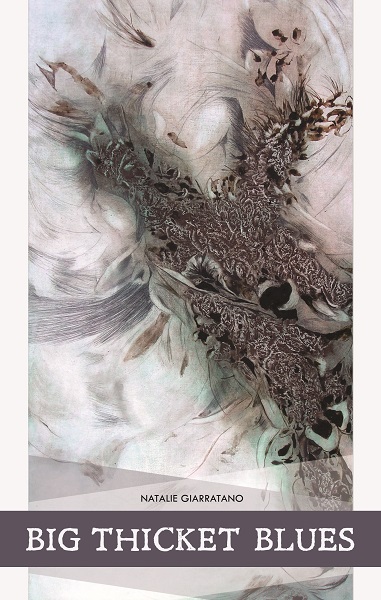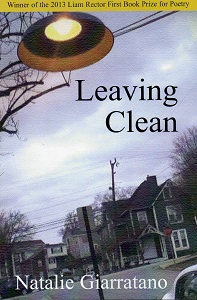Originally from small-town Southeast Texas, Natalie Giarratano received her Ph.D. in creative writing from
Western Michigan University. She is the author of Big Thicket Blues (Sundress Publications, January 2017) and
Leaving Clean, winner of the 2013 Liam Rector First Book Prize in Poetry (Briery Creek Press, 2013). Her poems
have appeared in Sakura Review, Black Tongue Review, Beltway Poetry,
Tupelo Quarterly, Tinderbox, and TYPO,
among others. She’s a freelance editor and lives in Northern Colorado with her partner, their daughter, and pup.
If you would like to get in touch with Natalie, email her at natalie.giarratano@gmail.com.

 Cover art by Karina Nöel Hean
Cover art by Karina Nöel Hean
Big Thicket Blues
Available for pre-order from Sundress Publications.
About Big Thicket Blues (January 2017, Sundress Publications):
Giarratano’s mature and stirring second book is drenched in Place — East Texas, the Thicket, the Pines the Pines,
the bright and dark swelter of it all — immersed in knowing that Place is a deep geography — and that Place is a
terrain shaped by histories and memory, an undergrowth of events and beliefs that wound, shame, haunt and
sometimes painfully heal — a tangle of family faith and fear — Place is a skin worn beyond horizons and
borders — is dragged with us everywhere we go — in these poems place is what is known and what is imagined —
origin and destination —
~Mark Turcotte, author of Exploding Chippewas
Consider yourself warned: this intricately carved, seamlessly patchworked foray into a boiling machinery of heritage,
sin and deliverance may haunt itself into your dreams. Big Thicket Blues is so crammed with music, so lucid and
tangled, so lifted into sky past bramble and past the tinnitus of our ordinary pains that it delivers us into a
brilliance all its own. Make sure you know how to listen to what could kill or cure you before you bring down the
needle on Giarratano’s indelible groove—and remember: don’t trust anyone who cannot allow music / to suck them deep,
the way I’ve always wanted some god to /suck me into that kind of epic darkness....
~Tyehimba Jess, author of Olio
Big Thicket Blues is a siren’s song. Giarratano understands the bewitching, seductive music of words, and while one
reads each poem—poems of social justice, poems of domestic despair—the dangerous truth of them eludes you. Reader,
spend time with these poems at your peril because the cutting truth lingers long after the music fades.
~TJ Jarrett, author of Zion
The poems in Natalie Giarratano’s Big Thicket Blues are shape-shifting, with speakers who probe the moments
“when we and they / are so far apart,” terrorized by “unholy hands / that’d start a war or fill our throats with
cement”—whether in Texas, or Terezin. Risk-taking Leadbelly homage, family reportage, and internal-music montage
all represent here, to remind us of the many ephemeral bodies we share. And beneath them all, a seething: to “Light
up from the inside so that the place burns.”
~Ailish Hopper, author of Dark~Sky Society

Leaving Clean
Request a signed copy directly from Natalie
About Leaving Clean (July 2013, Briery Creek Press):
“I understand bayous,” says Natalie Giarratano in Leaving Clean. This is not a poet who celebrates
place—her Orange, Texas—she simply knows it, knows what happens there, how the trees are
bracing themselves for the hurricane, knows the mired look of a car on its back at the side of a
muddy woods, the names of boats that brought slaves into Texas. She speaks of dark things in a
voice that is quiet, but it is not shy; it is not even peaceful. Maybe it’s subtlety I’m talking about
(perceptive being one of its synonyms), a humor that’s dire but unassuming, an anger that sort of
travels under the radar. And what other poet would think to give a voice to a pair of tennis shoes
that, hanging from a telephone wire, instruct us on the nature of time? Only Natalie Giarratano, with
her wary grace and her vision that’s finally, somehow, redemptive.
~Nancy Eimers
Natalie Giarratano’s debut volume Leaving Clean brings to light a brilliant poetry that knows that the
heart must break if it is to heal, again and again. In poems that evoke all the complex pungencies of
the Texas Bayou, a weird, wholly recognizable America rises, ever ready to turn its head on the past
it both creates and neglects. These poems contend with the ubiquity of violence in the individual
consciousness, as they argue, implicitly or explicitly, with a vengeful God that embodies the
cruelties we would not understand about ourselves. And there is grace here, and a kind of humility
that refuses to be modest, and a longing that extends into the backwards of time, in details rendered
magically and lovingly enough that individual and collective shame is out-ted and transformed by
poetry into a common, intimate language.
~William Olsen
In her stunning first book, Leaving Clean, Natalie Giarratano offers us an incisive look at a fallen
world, cleansed neither of cruelty nor affection, of bitterness nor conflicted debt, what summons
us to lines that, with a precision of wit and heartbreak, refuse the clean and easy answers. Again and
again we find the spit of gods and fathers and the deep hunger of the traveler who longs to purge
herself of such. There is no map to get us out of this place. Better yet, we have poems of fierce grace
and difficult beauty, poems that plot escape but argue against it. In them we fall back to earth like
love or some such gift of hard rain that dreams of nothing less.
~Bruce Bond
Leaving Clean is the debut of a new, original voice where the cartography of poet Natalie Giarratano’s
inner visions turn themselves further inward, “the eye’s internal stare, / standing guard on the shore
of her body / with lighthouse intensity,” interrogating the ruinous borders of memory where the
poet dares her craft and gaze to take us. These poems refuse to look away and beg to be revisited
over and over. You trust the power and vulnerability of this poet at once. In Leaving Clean, you
will find a profound country unlike any other. Giarratano’s poems concern themselves with
family, secrets, memory, “the spit of God,” the body, the physical world, and a broader, tempered
omniscience about life itself. Against and within her voice, we are never lost or stranded by her
awareness, “We’ve constructed a room / from ourselves where we hide / what secrets we have left.”
You come through these poems as through a fire. It is exactly how Natalie Giarratano tells us: “It’s
then I know there is no map I can buy / to show me the way out of here.”
~Rachel Eliza Griffiths
Events
Past Events
with W. Joe Hoppe & Ben Kopel
Friday, September 12th, 2014
7:30 p.m.
Fun Party Reading Series
grayDUCK Gallery
Austin, TX
with Karissa Morton & Harold Whit Williams
Saturday, September 13th, 2014
6:00 p.m.
Kraken Reading Series
The Paschall Bar
Denton, TX
Thursday, November 6th, 2014
8 p.m.
Frostic Reading Series
Western Michigan University
Kalamazoo, MI
with Eric Pankey & others
Tuesday, August 19th, 2014
7:30 p.m.
The Inner Loop Reading Series
The Carriage House
Washington, DC
w/ poet Cindy St. John
Friday, November 8th, 2013
6 p.m.
Beloved Books & Gallery
Flying Monkey Arts Center
Lowe Mill
2211 Seminole Dr. #273
Huntsville, Alabama 35805
w/ poet Cindy St. John
Saturday, November 9th, 2013
Venue and Time TBA
Black Sheep Reading Series
Lexington, Kentucky 40502


